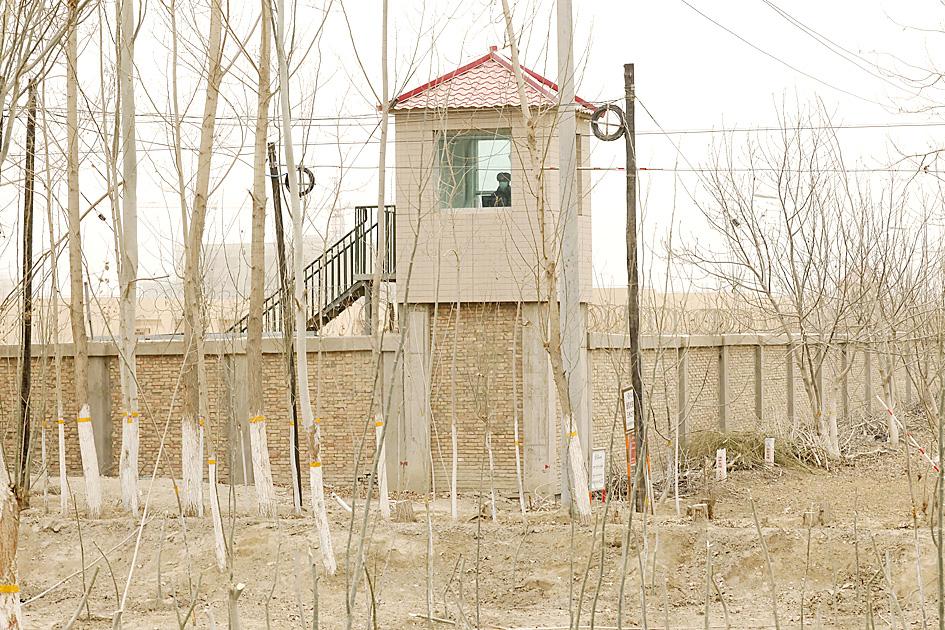Dutch Prime Minister Mark Rutte said he opposes reconsidering trade relations with China over its policies toward Hong Kong and its Uighur minority.
Rutte, whose country is among the EU countries most closely intertwined with Chinese production chains, said the EU should address those topics, but should not isolate countries that do not live up to European standards.
His comments in an interview feed into Europe’s reassessment of individual and collective relations with China triggered most immediately by Russia’s war on Ukraine.

Photo: AP
Cutting ties with China would not “help anyone in Hong Kong or the Uighurs,” Rutte said in Brussels after an EU summit.
“This is one of the reasons I believe the EU should be more of a geopolitical powerhouse, that we have to develop our own policies toward China, in close connection with the US,” he said.
The Netherlands was the biggest importer of goods from China last year, according to EU data. China is the country’s third-biggest trade partner after neighbors Germany and Belgium.
Dutch-based chip machine builder ASML Holding NV plays a sensitive role in trade relations due to China’s reliance on ASML technology to build up its chipmaking industry. The company has not been granted an export license to ship its most advanced machines to China.
A trade dispute with China would have high costs for the Netherlands, a government economic analysis agency, the Central Planning Bureau, said last week.
Recent EU-Chinese contacts have reflected tensions in the relationship. After a summit in April, EU High Representative for Foreign Affairs and Security Policy Josep Borrell said the talks were “a dialogue of the deaf,” with China refusing to discuss the war in Ukraine, human rights or other issues between the two sides.
China has been accused of running a state-sponsored forced-labor program in Xinjiang under the guise of poverty alleviation efforts, sending as many as 1 million Uighurs to so-called re-education camps.
China has repeatedly denied mistreatment of Uighurs and says crackdowns in Hong Kong are to prevent insurrection.
Rutte said that he always addresses the issues with China, including the last time he spoke to Chinese Premier Li Keqiang (李克強).
Even so, he said: “You cannot close off relationships with countries which are not living up to our standards.”

CHAOS: Iranians took to the streets playing celebratory music after reports of Khamenei’s death on Saturday, while mourners also gathered in Tehran yesterday Iranian Supreme Leader Ayatollah Ali Khamenei was killed in a major attack on Iran launched by Israel and the US, throwing the future of the Islamic republic into doubt and raising the risk of regional instability. Iranian state television and the state-run IRNA news agency announced the 86-year-old’s death early yesterday. US President Donald Trump said it gave Iranians their “greatest chance” to “take back” their country. The announcements came after a joint US and Israeli aerial bombardment that targeted Iranian military and governmental sites. Trump said the “heavy and pinpoint bombing” would continue through the week or as long

TRUST: The KMT said it respected the US’ timing and considerations, and hoped it would continue to honor its commitments to helping Taiwan bolster its defenses and deterrence US President Donald Trump is delaying a multibillion-dollar arms sale to Taiwan to ensure his visit to Beijing is successful, a New York Times report said. The weapons sales package has stalled in the US Department of State, the report said, citing US officials it did not identify. The White House has told agencies not to push forward ahead of Trump’s meeting with Chinese President Xi Jinping (習近平), it said. The two last month held a phone call to discuss trade and geopolitical flashpoints ahead of the summit. Xi raised the Taiwan issue and urged the US to handle arms sales to

BIG SPENDERS: Foreign investors bought the most Taiwan equities since 2005, signaling confidence that an AI boom would continue to benefit chipmakers Taiwan Semiconductor Manufacturing Co’s (TSMC, 台積電) market capitalization swelled to US$2 trillion for the first time following a 4.25 percent rally in its American depositary receipts (ADR) overnight, putting the world’s biggest contract chipmaker sixth on the list of the world’s biggest companies by market capitalization, just behind Amazon.com Inc. The site CompaniesMarketcap.com ranked TSMC ahead of Saudi Aramco and Meta Platforms Inc. The Taiwanese company’s ADRs on Tuesday surged to US$385.75 on the New York Stock Exchange, as strong demand for artificial intelligence (AI) applications led to chip supply constraints and boost revenue growth to record-breaking levels. Each TSMC ADR represents

Pro-democracy media tycoon Jimmy Lai’s (黎智英) fraud conviction and prison sentence were yesterday overturned by a Hong Kong court, in a surprise legal decision that comes soon after Lai was jailed for 20 years on a separate national security charge. Judges Jeremy Poon (潘兆初), Anthea Pang (彭寶琴) and Derek Pang (彭偉昌) said in the judgement that they allowed the appeal from Lai, and another defendant in the case, to proceed, as a lower court judge had “erred.” “The Court of Appeal gave them leave to appeal against their conviction, allowed their appeals, quashed the convictions and set aside the sentences,” the judges